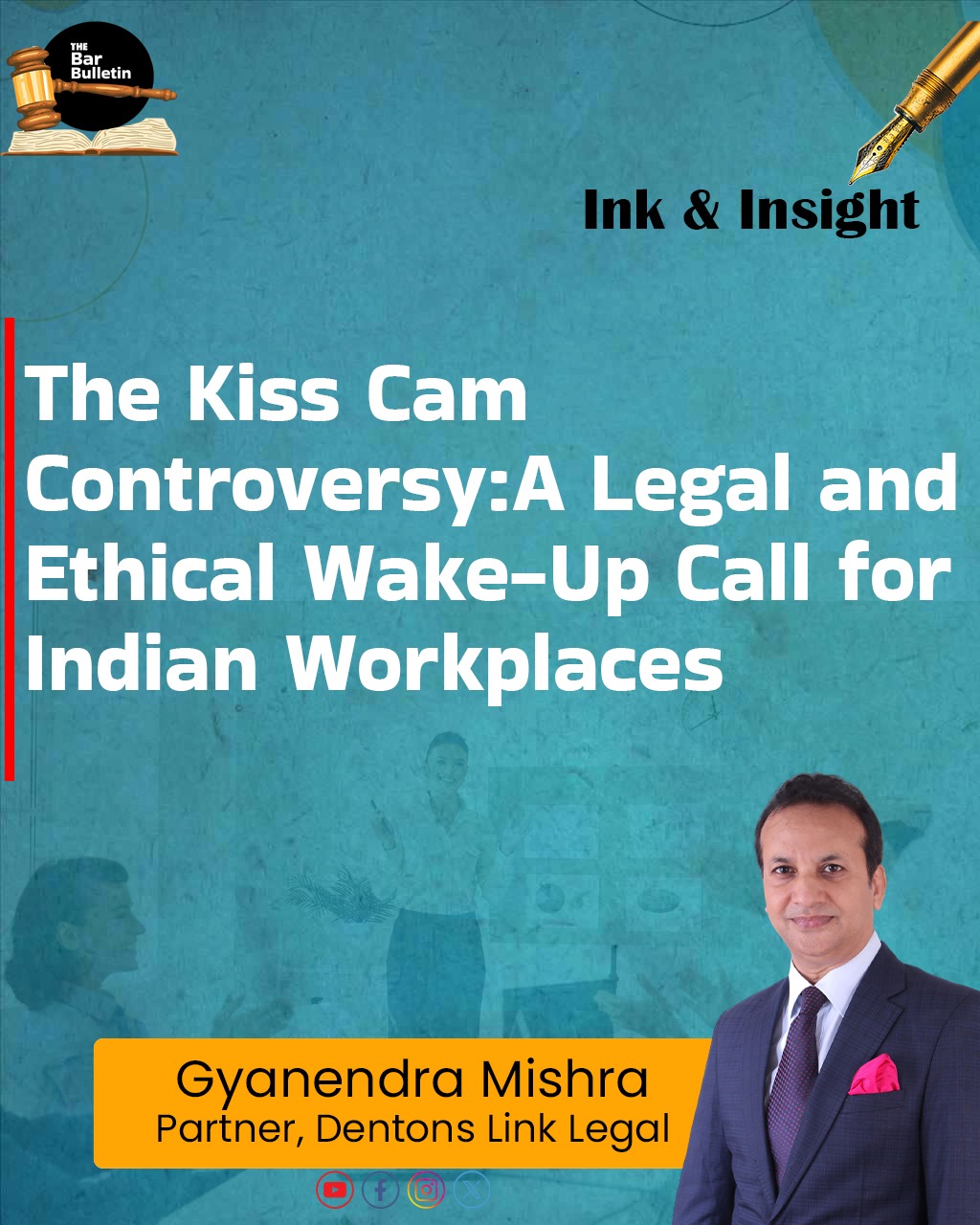The viral “Kiss Cam” video from a Coldplay concert, which led to the resignation of Astronomer CEO Andy Byron, has sent ripples far beyond the world of tech and entertainment. While the incident unfolded in the United States, its implications are a crucial case study for Indian companies navigating the complexities of workplace romance in an increasingly scrutinized digital age.
From an Indian legal perspective, the scandal raises pressing questions about employment law, corporate governance, and the often-overlooked right to privacy in the workplace.
- The Employer’s Legal and Ethical Duty: Beyond Just “Don’t Ask, Don’t Tell”
Indian law does not explicitly prohibit or regulate consensual workplace relationships. However, a company’s legal obligations kick in the moment such a relationship creates a conflict of interest, an unhealthy work environment, or a potential for harassment. The Astronomer case, involving a CEO and a Chief People Officer, perfectly illustrates the highest level of this risk.
- Conflict of Interest: In India, this is the most significant legal and ethical hazard. A romantic relationship between a CEO and the head of HR—the very person responsible for investigating workplace complaints, promotions, and compensation—is a clear violation of a company’s fiduciary duty. It compromises the impartiality of key corporate functions and can be grounds for termination under a robust Code of Conduct. Indian courts, while not directly addressing workplace romance, have consistently upheld an employer’s right to take action against employees for gross misconduct that damages the company’s reputation or creates a hostile work environment.
- The POSH Act, 2013: The Prevention of Sexual Harassment (POSH) Act is a crucial lens through which such relationships are viewed. While the Astronomer relationship was reportedly consensual, the power imbalance between a CEO and a CPO can be a major factor in a post-breakup harassment claim. An employee at a lower position could later allege coercion, and the employer would have a statutory duty to investigate the complaint. A clear workplace romance policy, which mandates disclosure and defines the boundaries of hierarchical relationships, is a company’s best defense against such claims.
- The Right to Privacy and the Digital Scrutiny
The Coldplay incident’s virality raises a distinct legal point under Indian law: the employee’s right to privacy. The Indian Supreme Court, in the landmark Justice K.S. Puttaswamy (Retd.) v. Union of India, (2017) 10 SCC 1 judgment, established the right to privacy as an intrinsic part of the right to life and personal liberty under Article 21 of the Constitution.
However, this right is not absolute, and its application to employee privacy, especially when an employee’s actions impact the company, is a complex legal tightrope.
- Public vs. Private: Legal experts in India would likely concur with their Western counterparts that an employee has no reasonable expectation of privacy when their actions are captured at a public event. The CEO’s conduct, while personal, was made public by a third party (the concert’s “Kiss Cam”) and had a direct impact on the company’s reputation, market perception, and internal morale.
- Workplace Surveillance and the DPDP Act, 2023: The incident also prompts a discussion on workplace privacy policies. The soon-to-be-enforced Digital Personal Data Protection (DPDP) Act, 2023, requires companies to process personal data for a “specific, clear, and lawful purpose.” While this mainly pertains to data collected by employers, it underscores the need for clear communication. An Indian company’s policy should clearly state that while it respects an employee’s privacy, it may monitor communications on company devices and platforms and take action for any external conduct that harms the company’s reputation or business interests. The employer’s right to protect its business, therefore, often takes precedence over the employee’s right to privacy in a public context.
- The Corporate Fallout: A Case for Clear Policies
Ultimately, the downfall of the CEO was not due to a violation of a law per se, but a breach of trust and a company’s Code of Conduct. In India, a strong, well-enforced workplace romance policy can be a proactive tool to manage these risks.
The policy should mandate a clear and transparent disclosure process for all consensual relationships, especially those with a power imbalance. Once disclosed, HR can implement measures such as changing reporting lines or departments to mitigate the risk of favoritism and conflict of interest. The policy should also explicitly state that violations can lead to disciplinary action, including termination, to protect the company’s integrity and the interests of all employees.
The Kiss Cam scandal is more than just a viral video. It is a modern-day cautionary tale demonstrating that in a digitally connected world, the personal choices of a company’s leaders can have a profound legal and ethical impact on the entire organization. For Indian companies, the message is clear: a comprehensive workplace romance policy is not a luxury, but a necessity to safeguard corporate governance and foster a truly fair and professional work environment.
*Partner, Dentons Link Legal



